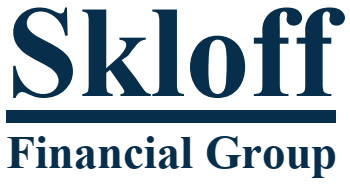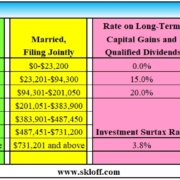Tax Benefits In Stock Market Losses – Independent Press

The Independent Press
Money Matters – Skloff Financial Group Question of the Month – September 7, 2011
By Aaron Skloff, AIF, CFA, MBA
Q: My investment portfolio has declined significantly in the past few months. Are there any tax benefits owed to me?
The Problem – Underutilized Tax Breaks
Many taxpayers simply complain about paying taxes, yet never turn the tables on the IRS. With the simple tax strategy discussed below, you can lock in tax benefits now instead of waiting until the end of the year. By then, your portfolio may recover and all the anxiety you are feeling would have never generated a tangible benefit.
The Solution – Tax Loss Harvesting
When you sell investments, such as stocks, bonds or mutual funds at a gain, you generally pay taxes on the capital gains. When you sell at a loss you can force the IRS to give you a tax break.
Basics on Capital Gains and Losses. Short-term capital gains are gains on investments held for a year or less and are taxed at your income tax rate. Long-term capital gains are gains on investments held for more than one year and are either not taxed, if you are at or below the 15% income tax bracket, or are at a 15% rate. An unlimited amount of short-term gains can be offset with short term losses. An unlimited amount of long-term gains can be offset with long-term losses. Additionally, you can force the IRS to provide you a net $3,000 annual loss against your income. If you are in the top tax bracket of 35%, you can avoid paying $1,050 in income taxes.
So, what happens if you end up with a $36,000 net loss, for example? You can carry over the full $36,000 into next year to offset any gains next year. If you have no gains to offset you can take a $3,000 annual loss against your income for 12 years. Unfortunately, carryover losses die when you die. Fortunately, your heirs’ cost basis on your inherited portfolio is its market value when you passed away – not your cost basis. If they were to sell the portfolio immediately they would have no capital gains taxes, even if the portfolio had appreciated 1,000% from when you originally purchased the portfolio.
The Wash Sale. Like life, the timing of your transactions are everything. The IRS discourages you from locking in your losses and buying back the same or substantially identical investment through its wash sale rule. You have a wash sale if you sell stock at a loss, and buy the same or substantially identical securities within 30 days before or after the sale. The wash sale period for any sale at a loss totals 61 days: the day of the sale, the 30 days before the sale and the 30 days after the sale. Note: these are calendar days, not trading days.
Avoiding Wash Sales. One of the best ways to avoid the wash sale rule is to replace your investment with something similar versus the ‘same or substantially identical.’ For example, replacing one large company stock mutual fund with a different large company stock mutual fund can avoid a wash sale. This may be a good time to lock in losses, as many of the global financial markets have declined simultaneously over the last few months.
Often Overlooked. Most mutual funds pay dividends, interest and capital gains. If you reinvest any of these into the same mutual funds it will increase your cost basis. Including the full cost basis will reduce the capital gain upon sale and reduce the amount of capital loss required to offset the gains. Work closely with your accountant and financial advisor to determine your cost basis to avoid unnecessary taxes.
Action Steps. Take Your Losses While the Takings Good. The temporarily depressed financial markets are proving a limited opportunity to lock in capital losses. As markets can recuperate quickly, waiting can work to your disadvantage. Turn the last few months of anxiety into a tax benefit – take your losses while the takings good.
Aaron Skloff, Accredited Investment Fiduciary (AIF), Chartered Financial Analyst (CFA), Master of Business Administration (MBA) is CEO of Skloff Financial Group, a Registered Investment Advisory firm based in Berkeley Heights. He can be contacted at www.skloff.com or 908-464-3060.













